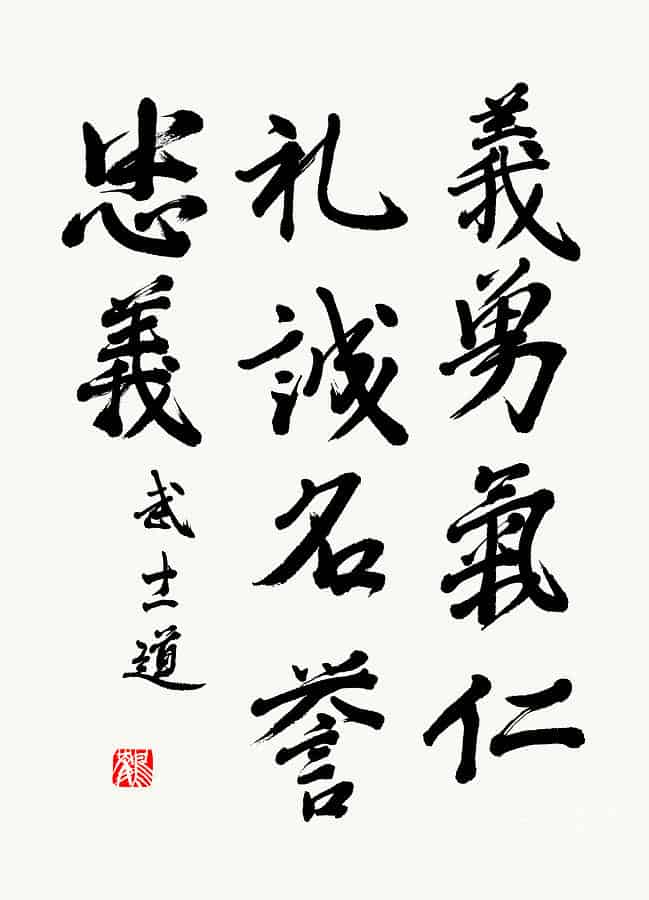Bushido – The Way of the Warrior
TATSU-RYU-BUSHIDO.com
TATSU-RYU-BUSHIDO.com | ![]()
![]() | Samurai
| Samurai
Bushido “The Way of the Warrior”
People do not stumble over mountains, but over molehills.” Confucius
Bushido refers to the samurai’s code of honor and regulated every aspect of everyday life, living and dying. The word is made up of bushi (warrior) and do (way) and means “the way of the warrior”. Bushido probably only emerged as a literal term late in the Tokugawa period and was allegedly not even known to Nitobe, who coined the term outside Japan at the end of the 19th century. The content of bushido was not written down, but lay in the heart of the warrior and probably developed parallel to the rise of the shogun Yoritomo in the 12th century (Nitobe, p. 5). The sources of bushido lie firstly in Buddhism, which is a faith related to fate and thus enables calm in the face of danger, secondly in Zen, which allows the mind to be strengthened through concentration and meditation, and thirdly in Shintoism, which contains the loyalty and piety inherent in bushido (Nitobe, p.9ff.). Philosophically, bushido is rooted largely in the teachings of Confucius and Meng Ke (Mencius, Chinese philosopher) and, according to Nitobe, is more an emotional impulse of the Japanese arising from love of country and loyalty to the emperor than a firmly written doctrine. It should be borne in mind that at that time (even in Nitobe’s time) the tenno was still the representative of the kingdom of heaven on earth and not just a symbolic head of state as in today’s secularized Japan. Although bushido is not set down in writing, it is captured by seven virtues or principles, which are almost identical to the seven kami of Shintoism and can be seen as an ethical system in the overall context (Blomberg, p. 59ff.). The first is Gi, sincerity, and describes a decision made by reason. The second, Yu, courage, means first assessing a situation correctly and then acting accordingly. Nitobe wrote succinctly: “Courage is doing what is right.” (Nitobe, p.25). The third is Jin, goodness, which means benevolence as universal love for others, as well as appreciating the beauty of the world around you (Nitobe, p. 33). This also includes engaging in other arts that are not interwoven with Budo. The fourth is Rei, courtesy, as a sincere feeling of respect towards others. Courtesy is therefore not a superficial phrase, but a real expression of respect for the other person. The fifth is makoto or shin, truth and truthfulness, which is closely linked to politeness. According to Nitobe, lying was not considered a sin by the samurai, but even worse a weakness. He speaks here of “Bushi no ichi-gon”, which he himself translates into English as “word of a samurai”. In the English version of his book, which he wrote, he also uses the German term “Ritterwort”. This means that the spoken word of a samurai was of such weight in terms of truthfulness that a written contract with a samurai was unusual and represented a serious insult to the honor of the bushi concerned (Nitobe, p. 57). The sixth is meiyo, honor, and means an appreciation of the duties and privileges of the samurai. Since the honor or even the name of the samurai was understood as an immortal part of existence, a violation of honor was unacceptable for the samurai (Nitobe, p. 66) and was restored by the death of the person concerned in the case of external guilt, or by ritual suicide (seppuku) out of shame in the case of personal guilt. The seventh is chugi, loyalty, and places the welfare of the group or community above the individual. As the individual samurai saw himself as coming from the state or country, the lord was seen as a representative of the same and was considered to be unconditionally loyal (Blomberg, p. 64ff.). Life itself was considered “favorable” as long as honor and glory could be gained through its loss, and the key to achieving this was the duty of loyalty (Nitobe, p. 74). The symbol for bushido is therefore the cherry blossom, because just as it falls from the tree in its most beautiful bloom, it was considered desirable for the samurai to die in battle in the prime of his life in accordance with the principles of honor and loyalty. The importance of this code, Bushido, can also be seen in the battle cry of the Japanese, which demoralized the American soldiers in World War II: Banzai. This translates as “10,000 years” and roughly means the willingness to exchange this period of time for the favor of the moment of this battle (Matsuoka, p. 422). Of course, the question for us is to what extent such principles of feudal Japan are still relevant today, or can still be valid. Especially for our martial art, Tatsu-ryu-Bushido, which emulates the code of the style name, this question is ultimately of interest and importance. For us, this is on the one hand a clarification of the value of Japanese culture and history in the practice of our martial art, but on the other hand it is universal values which, adapted to our time and society, can still have their validity as moral guidelines for the individual today. You will not be dishonored if the other person does not bow low enough and you do not have to swear unconditional obedience to a prince or leader, but sincerity, courage, kindness, politeness, truthfulness, honour and loyalty can still be virtues worth striving for today, as long as they are not misused ideologically. Some of these virtues are still present in various forms in the rules and labels of traditional martial arts.
»The most beautiful of all flowers is the cherry. The noblest of men is the samurai«. Japanese proverb



